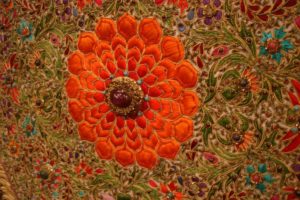Aloes
Today we will continue to stroll through God’s garden, pausing here and there under some trees of the Aguilaria genus which can reach up to 20 meters in height. They grow exclusively where rain is abundant and produce the aloeswood—also called agarwood—from which a very expensive perfume is made as well as costly incense. First-grade agarwood is one of the most expensive natural raw materials in the world. The current global market for agarwood is estimated to be in the range of 6 – 8 billion US$ and is growing rapidly. Its price goes from 20 Euros per kilo to 7,000 Euros depending of the quality of the raw material.
Agarwood emerges in the trunk and roots of the Aguilaria tree when it is being infected by a parasitic mold, the Phaeoacremonium parasitica, a dark-walled fungus. To fight the infection the tree produces a resin that slows down the deadly fungal growth. During this process the wood changes color, passing from light beige to dark brown or even black. This dark wood is what is called ‘aloeswood’ or ‘agarwood’. When distilled a very peculiar fragrant oil is produced, resulting in one of the most valuable oil in the world, which is called aloes in the Bible.
Aloes in the Gospel of John
 This costly perfume is mentioned in the nineteenth chapter of the Gospel of John: “And Nicodemus, who at first came to Jesus by night, also came, bringing a mixture of myrrh and aloes, about a hundred pounds. Then they took the body of Jesus, and bound it in strips of linen with the spices, as the custom of the Jews is to bury.” (vv. 39,40).
This costly perfume is mentioned in the nineteenth chapter of the Gospel of John: “And Nicodemus, who at first came to Jesus by night, also came, bringing a mixture of myrrh and aloes, about a hundred pounds. Then they took the body of Jesus, and bound it in strips of linen with the spices, as the custom of the Jews is to bury.” (vv. 39,40).
What a wonderful expression of fervent love. As Mary had done a few days earlier (see Mark 14:3), Nicodemus gave his very best without considering the cost. Without a doubt the fragrant anointing was aromatic to God, but Mary’s and Nicodemus’ intention and disposition were also sweet-smelling and well pleasing to Him. As Paul wrote to the Philippians:
Indeed I have all and abound. I am full, having received from Epaphroditus the things sent from you, a sweet-smelling aroma, an acceptable sacrifice, well pleasing to God” (Philippians 4:18).
These words befit any sacrifice proceeding from love as in the case of Mary and Nicodemus. These lovers were not only willing to live for Jesus; they were also willing to die for Him. For they knew that such dying was a doorway to glorification.
A glorious metamorphosis
 The Aguilaria tree is a wonderful example of glorification resulting from death, for when the tree is infected by the lethal parasites there is no hope of survival. But it is precisely in the process of dying that the Aguilaria tree is exalted into aloeswood. In spite of all appearances it undergoes, so to speak, a glorification.
The Aguilaria tree is a wonderful example of glorification resulting from death, for when the tree is infected by the lethal parasites there is no hope of survival. But it is precisely in the process of dying that the Aguilaria tree is exalted into aloeswood. In spite of all appearances it undergoes, so to speak, a glorification.
This is a wonderful image of Jesus. He knew the Father wanted, among other things, aloes proceeding from His garden. So He was willing to give His life so He could yield the best perfume among all perfumes. This is what the apostle Paul had in mind when he wrote: “And walk in love, as Christ also has loved us and given Himself for us, an offering and a sacrifice to God for a sweet-smelling aroma” (Ephesians 5:2). He was indeed the Son in whom the Father was well pleased, an example for all lovers to follow.
As the Bridegroom so is the bride
In the Song of Solomon 4:12–15 we learn that the bride of God’s own Son produces aloes in her garden. Verse 12 says, “A garden enclosed is my sister, my spouse…” and in verse 14 aloes is mentioned as one of the plants of this supreme garden. It follows that as the Bridegroom offers himself as an oblation, so does the bride.
What a love story it tells us! What a passion! What a surrender! This was the life of Christ and this is the life of His bride.
Paul also was a lover in whose garden aloes was produced. Listen to what he says:
Always carrying about in the body the dying of the Lord Jesus, that the life of Jesus also may be manifested in our body. 11 For we who live are always delivered to death for Jesus’ sake, that the life of Jesus also may be manifested in our mortal flesh.12 So then death is working in us, but life in you” (2 Corinthians 4:10–12).
These are the words of a lover who knew how important aloes was in the sight of God. He had the exquisite oil because he shared in the dying.
Today thousands of Christians pray for revival, but how many among them are willing to carry about in their body the dying of the Lord Jesus? Only through such a dying can the Life of the Son be manifested in us. There is no shortcut. And the manifestation will carry the supreme fragrance of aloes.
A hidden blessing
To us the grace has been given not only to live His life, but also to experience His dying. The apostle to the gentiles had understood it well. No wonder he could say: “For to you it has been granted on behalf of Christ, not only to believe in Him, but also to suffer for His sake” (Philippians 1:29). Let us offer to God aloes from our garden, together with myrrh, spikenard and all the chief spices, for He is worthy of our deepest love.
Attributions—Rainforest by Vinicius Depizzol—Agarwood by Angel Schatz —Man selling perfume by Koshy Koshy
If you think this post can help somebody else you can share it with the options presented bellow.













